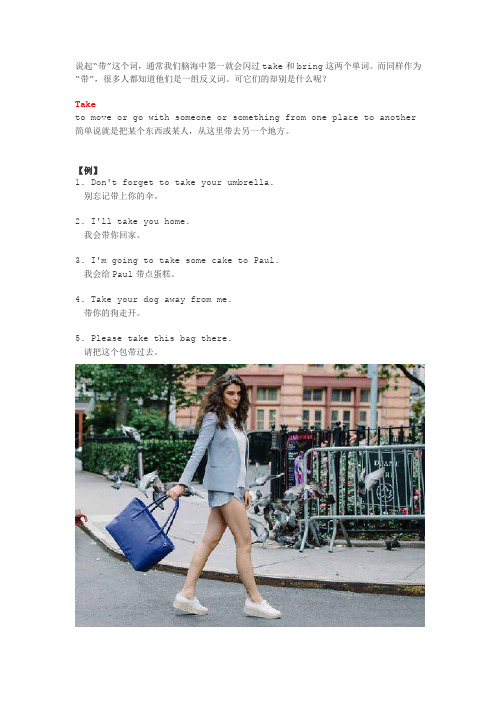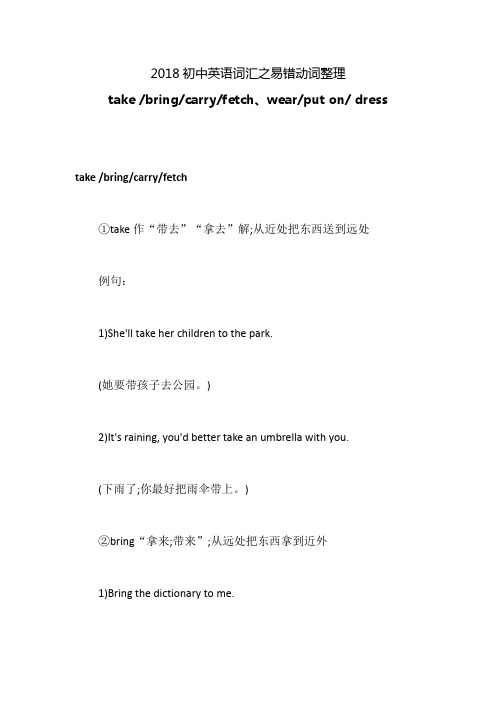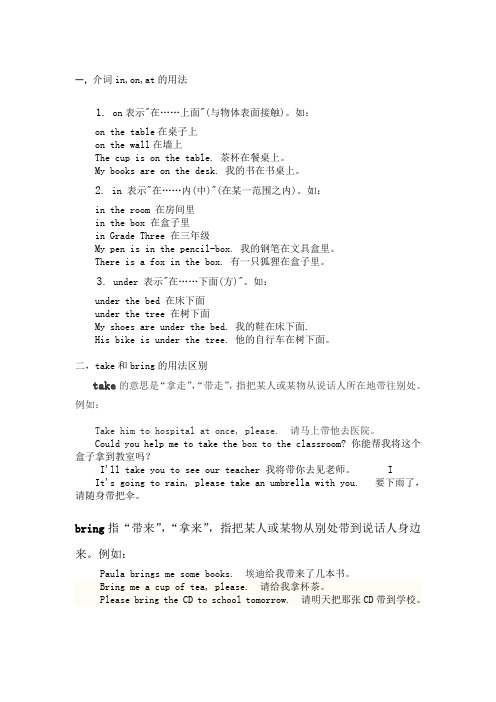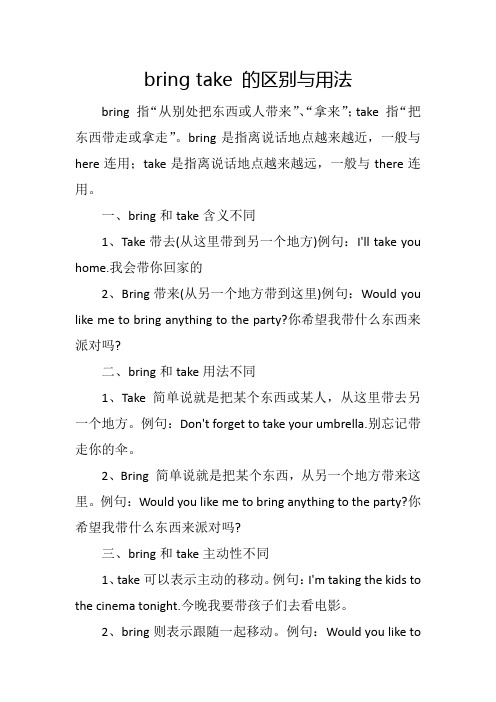bring和take区别
take和bring的区别用法

take和bring的区别用法take和bring的区别用法概述在英语中,“take”和”bring”都是表示携带或带来某物的动词,但在使用上有一些区别。
本文就这两个词的用法做详细讲解。
用法一:方向的不同1.“take”通常表示从说话人所在位置或所在地带走或携带,如:–Please take this book to the library.(请把这本书带到图书馆。
)2.“bring”通常表示朝说话人所在位置或所在地带来或携带,如:–Can you bring me a glass of water?(你能给我拿一杯水吗?)用法二:焦点的不同1.“take”通常强调从某处到另一处的移动,如:–I took the bus to work this morning.(我今天早上坐公共汽车上班。
)2.“bring”通常强调从别处到说话人所在位置的移动,如:–She will bring the cake to the party.(她会把蛋糕带到派对上。
)用法三:参照点的不同1.“take”的参照点通常是说话人自身或所在位置,如:–Take your umbrella with you.(带上你的雨伞。
)2.“bring”的参照点通常是说话人所在的位置,如:–Please bring your ID card when you come.(请你来的时候带上你的身份证。
)用法四:物品的不同1.“take”通常用于将物品从某处带走,如:–He took the newspaper out of the bag.(他把报纸从包里拿出来。
)2.“bring”通常用于将物品带到说话人所在位置,如:–Could you bring me a pen from your office?(你能从你的办公室给我带一支笔来吗?)用法五:与人相关的不同1.“take”可以指带走或携带某人,如:–She took her children to the park.(她带着她的孩子去了公园。
Take和bring到底怎么用?

说起“带”这个词,通常我们脑海中第一就会闪过take和bring这两个单词。
而同样作为“带”,很多人都知道他们是一组反义词。
可它们的却别是什么呢?Taketo move or go with someone or something from one place to another 简单说就是把某个东西或某人,从这里带去另一个地方。
【例】1. Don't forget to take your umbrella.别忘记带上你的伞。
2. I'll take you home.我会带你回家。
3. I'm going to take some cake to Paul.我会给Paul带点蛋糕。
4. Take your dog away from me.带你的狗走开。
5. Please take this bag there.请把这个包带过去。
Bringto take something or someone with you to the place where you are now, or to the place you are talking about简单说就是把某个东西,从另一个地方带来(说话人)这里。
【例】1. Would you like me to bring anything to the party?你希望我带什么东西来派对吗?2. She brought her Spanish friend into class.她把她的西班牙朋友带到班里来了。
3. Bring some food to the party at my house.带一些食物到我家的派对来。
4. Bring your homework to me.把你的作业带给我。
5. Please bring that bag here.请把那个包带来这里。
"Bring" shows movement toward the speaker, but "take" shows movement away from the speaker.所以,take和bring的区别用法相当简单,一点就通:take是“(带)去”,bring是“(带)来”。
2018初中英语词汇之易错动词整理【(take、 bring、carry、fetch)(wear、put on 、dress)】

2018初中英语词汇之易错动词整理take /bring/carry/fetch、wear/put on/ dress take /bring/carry/fetch①take作“带去”“拿去”解;从近处把东西送到远处例句:1)She'll take her children to the park.(她要带孩子去公园。
)2)It's raining, you'd better take an umbrella with you.(下雨了;你最好把雨伞带上。
)②bring“拿来;带来”;从远处把东西拿到近外1)Bring the dictionary to me.(把字典拿给我。
)2)Please bring your report with you when you come tomorrow. (明天你来的时候,请把你的报告带来。
)③carry作“携带,带去;搬运”1)She always carries a red handbag.(她总是带一个红色手包。
)2)Please carry this TV set upstairs.(请把这台电视搬到楼上去。
)④fetch作“去…取来,拿来;叫某人来”1)The football is over there. Fetch it please.(足球在那边呢,请把它拿回来。
)2)Fetch the police at once. We've found the robber.(马上去叫警察来,我们已经发现那个抢劫的人。
)wear/put on/ dress①wear穿着,戴;留,表示“状态”是及物动词需加宾语例句:1)She always wears a pair of glasses.(她总是戴着一副眼镜。
)2)He wears a black jacket today.(今天他穿着一件黑色的夹克。
)②put on穿上,戴上,表示“动作”例句:。
bring take carry的区别与用法

bring take carry的区别与用法
嘿,咱今儿就来好好唠唠“bring take carry”的区别与用法,宝子们可得听好啦!
先说说“bring”,它呀,就像是你给别人带个东西过来。
比如说,“I will bring you a cup of coffee.”(我会给你带一杯咖啡。
)这是不是很形象呀?就像你把东西从别的地方带到特定的人这里。
再瞧瞧“take”,这就有点像你把东西拿走啦!像“Take this book with you.”(把这本书带走。
)就感觉是把东西从这儿弄到别的地儿去。
然后呢,是“carry”,想象一下你背着个重重的包,那不就是在“carry”嘛。
比如说“She carried a big suitcase.”(她提着一个大行李箱。
)就是这种拎着、扛着的感觉呀。
哎呀,“bring take carry”这三者区别可大啦,咱可不能弄错呀!你想想,要是该用“bring”的时候用成“take”,那不就闹笑话啦?
所以说呀,得好好记住它们的区别和用法,这样咱说话、写东西才不会出错呢,对吧?以后咱就可以准确无误地用它们啦!。
in on at take和bring用法

一,介词in,on,at的用法1. on表示"在……上面"(与物体表面接触)。
如:on the table在桌子上on the wall在墙上The cup is on the table. 茶杯在餐桌上。
My books are on the desk. 我的书在书桌上。
2. in 表示"在……内(中)"(在某一范围之内)。
如:in the room 在房间里in the box 在盒子里in Grade Three 在三年级My pen is in the pencil-box. 我的钢笔在文具盒里。
There is a fox in the box. 有一只狐狸在盒子里。
3. under 表示"在……下面(方)"。
如:under the bed 在床下面under the tree 在树下面My shoes are under the bed. 我的鞋在床下面.His bike is under the tree. 他的自行车在树下面。
二,take和bring的用法区别take的意思是“拿走”,“带走”,指把某人或某物从说话人所在地带往别处。
例如:Take him to hospital at once, please. 请马上带他去医院。
Could you help me to take the box to the classroom? 你能帮我将这个盒子拿到教室吗?I'll take you to see our teacher我将带你去见老师。
IIt's going to rain, please take an umbrella with you. 要下雨了,请随身带把伞。
bring指“带来”,“拿来”,指把某人或某物从别处带到说话人身边来。
例如:Paula brings me some books. 埃迪给我带来了几本书。
bring,take,carry,fetch的区别

巩固练习
用bring、take、fetch或carry填空. 1.He__t_o_o_k_the book with him when he left. 2.The east wind __b_r_i_n_g_s__ a lot of rain to my
hometown every year. 3.Please __fe_t_c_h__ some chairs from the next room. 4.Will you please _c_a_r_ry__the box for me? 5.My father is going to_t_a_k_e_me to Beijing next week.
Eg: Please take the books to the library for me. carry v.携带;搬运 carry--carried--carried 不强调方向,但有负重之意
Eg: The teacher carried the box into the room. fetch 拿来;取来,强调来回往返的两个动作,构成 fetch sth. for sb. 给 某人取来某物,与get用法相同
每日一知 bring,take,carry,fetch
bring v.带来 bring--brought--brought ,指从别的地方带到说话的地 方来,构成短语bring..to... 把...带到...,bring sb. sth. 给某人带来某物 Eg:Don't forget to bring your homework here tomorrow. take v.带走 take--took--taken ,指从说话的地方带到其他地方去, 常 构成短语take...to... 带某人/某物去某地
bring 带来 take带走

bring 带来带到说话者这来bring..from 从.到来bring heretake 带走从说话者这带走take .to .take there两者方向相反带来还是带走要站在主语的角度去考虑can you lend me a pen 主语you 借给me 所以是向外借用lend都含“拿”、“带”、“取”的意思。
bring 指“从别处把东西或人带来”、“拿来”, 如:He brought a new book with him.他带来一本新书。
take 指“把东西带走或拿走”, 如:Please take the letter to the post office.请把这封信送到邮局去。
∙ e.g.Mary has brought me a very lovely ring from U.S.玛丽从美国带了一只漂亮的戒指给我.e.g.My mum asked me to take my lunch box with me.我的妈妈让我带好我的饭盒(饭盒从妈妈这里转移到了我这里,用take) ∙bring,take和carry这三个词都和“拿、取”有关,但要注意三者之间的区别:bring意为“带来,拿来”,指把某物或某人从另一个地方带到说话的地方来,也可以说是“由远及近”.例如:Bring me your dictionary tomorrow.明天把你的词典给我拿来.take(带走)意为把某物或某人从说话的地方带到另一个地方去,也可以说是“由近及远”,常和介词to构成搭配.例如:Can you help me take the books to the classroom?你能帮我把这些书带到教室去吗?carry意思是“提、扛、搬、携带”,意思较多,但没有方向性.例如:(1)Will you please carry the box for me?你替我扛那个箱子好吗?(2) Li Dong is carrying water.李东在提水bring 一般有“把.带过来,拿过来”的意思如 bring your coat here 把它带过来这里,拿过来这里而take 是“把.带走,带离这里”的意思take away your coat 把你的大衣带走,带离开这里通俗点理解例如两个在正在某地方对话,那如果是把东西从这里地方带走,就是taketake the book to him 把书带去给他如果是把东西从别的地方带过来正在对话的这个地方,就是bring。
bring take 的区别与用法

bring take 的区别与用法
bring 指“从别处把东西或人带来”、“拿来”;take 指“把东西带走或拿走”。
bring是指离说话地点越来越近,一般与here连用;take是指离说话地点越来越远,一般与there连用。
一、bring和take含义不同
1、Take带去(从这里带到另一个地方)例句:I'll take you home.我会带你回家的
2、Bring带来(从另一个地方带到这里)例句:Would you like me to bring anything to the party?你希望我带什么东西来派对吗?
二、bring和take用法不同
1、Take 简单说就是把某个东西或某人,从这里带去另一个地方。
例句:Don't forget to take your umbrella.别忘记带走你的伞。
2、Bring 简单说就是把某个东西,从另一个地方带来这里。
例句:Would you like me to bring anything to the party?你希望我带什么东西来派对吗?
三、bring和take主动性不同
1、take可以表示主动的移动。
例句:I'm taking the kids to the cinema tonight.今晚我要带孩子们去看电影。
2、bring则表示跟随一起移动。
例句:Would you like to
come with usand bring Susie?你愿意和我们带上苏西跟我们去吗?。
- 1、下载文档前请自行甄别文档内容的完整性,平台不提供额外的编辑、内容补充、找答案等附加服务。
- 2、"仅部分预览"的文档,不可在线预览部分如存在完整性等问题,可反馈申请退款(可完整预览的文档不适用该条件!)。
- 3、如文档侵犯您的权益,请联系客服反馈,我们会尽快为您处理(人工客服工作时间:9:00-18:30)。
• There are gray areas where the bringing and the taking aren't so clear. Say you're a dinner guest and you decide to tote a bottle of wine along with you. Do you bring it or do you take it? The answer depends on your perspective—on which end of the journey you're talking about, the origin or the destination. 'What shall I bring, white or red?' you ask the host. 'Bring red,' he replies. (Both you and he are speaking of the wine from the point of view of its destination—the host.) Ten minutes later, you're asking the wine merchant, 'What should I take, a Burgundy or a Bordeaux?' 'Take this one,' she says. (Both you and she are speaking of the wine from the point of view of its origin.) Clear? If not, pour yourself a glass, take it easy, and say what sounds most natural. You'll probably be right.
• Where the point of view is uncertain or irrelevant, either verb may be used. In some cases, idiom determines the choice between bring and take.
Examples
• Bring is established in expressions like bring to light, bring to justice, and bring to the table, perhaps because there's a figurative implication that the writer or speaker is in the light, at the seat of justice, or at the table.
• The rule becomes complicated when the movement has nothing to do with the speaker—e.g.: 'When my dad was courting my mom, a single mother of two, he used to take her a bag of groceries instead of flowers.' In such a situation, the choice of bring or take depends on motion toward or away from whatever is being discussed. So in the previous example, bring would work as well if the point of view was that of the mother rather than the father.
• "Take This Job and Shove It" (song by David Allan Coe, 1978) • "If this is coffee, please bring tea, please bring me
some coffee." (attributed to Abraham Lincoln) • "Logic will get you from A to B. Imagination will take you everywhere."
bring VS take
The verbs bring and take both involve movement, but in different directions in
relation to the speaker.
Definitions
• In most cases, bring suggests movement toward the speaker ("Bring it to me") while take suggests a movement away from the speaker ("Take it to your brother").
• One reason people get confused about bring and take is that there are many exceptions to the basic rules. For example, idioms such as bring home the bacon and take a bath and phrasal verbs such as bring up, bring about, take down, and take after don't comply with the rule that bring means to cause something to go to the speaker and take means to cause something to go away from the speaker.
• Bring Me the Head of Alfredo Garcia (the title of a film directed by Sam Peckinpah, 1974)
• "Take Me Out to the Ball Game" (song by Jack Norworth and Albert Von Tilzer, 1908)
• Here's how Charles Harrington Elster illustrates the rule in The Accidents of Style: "[W]hen you go to a restaurant they bring the food to your table and take your money when you're done.”
